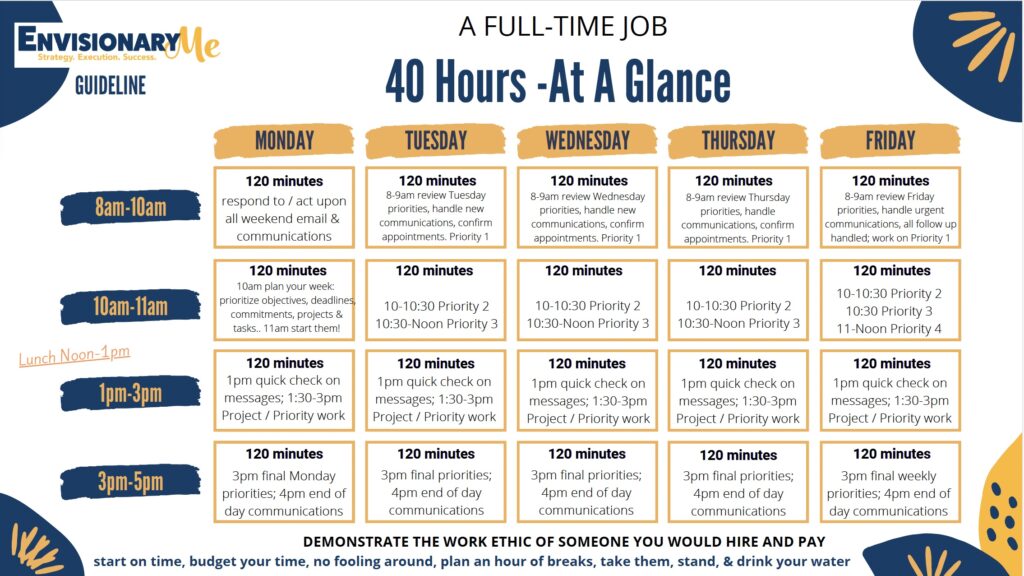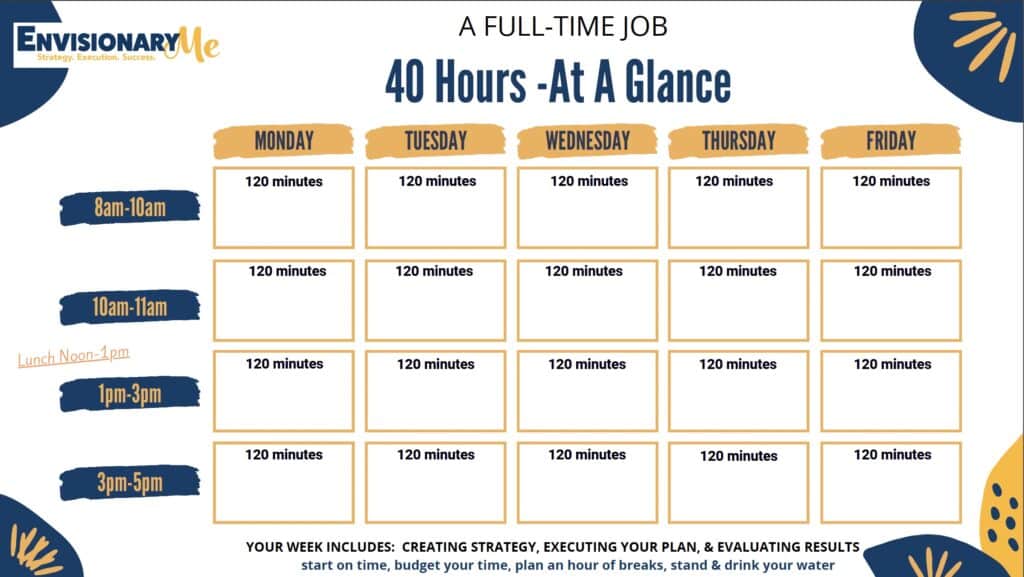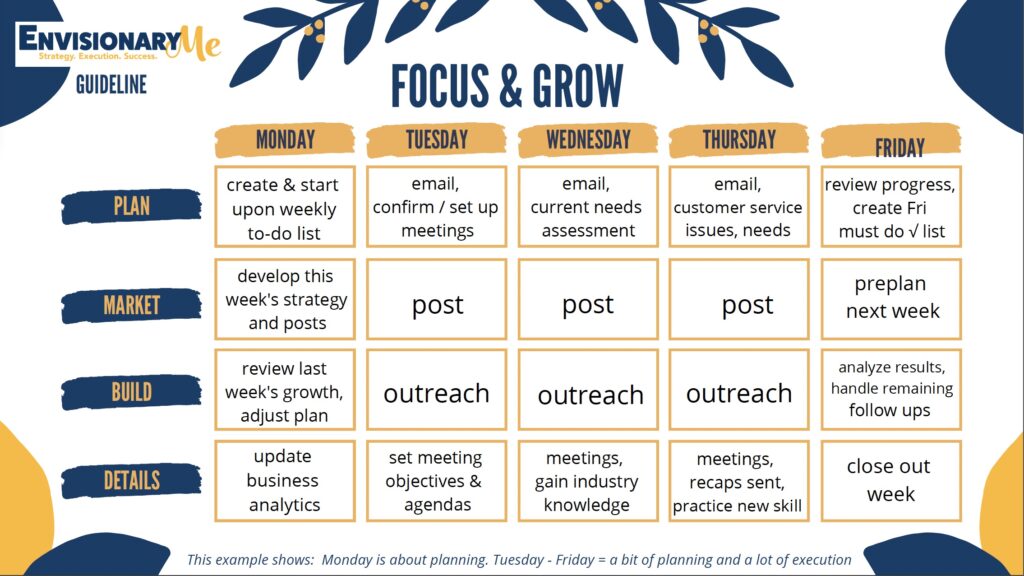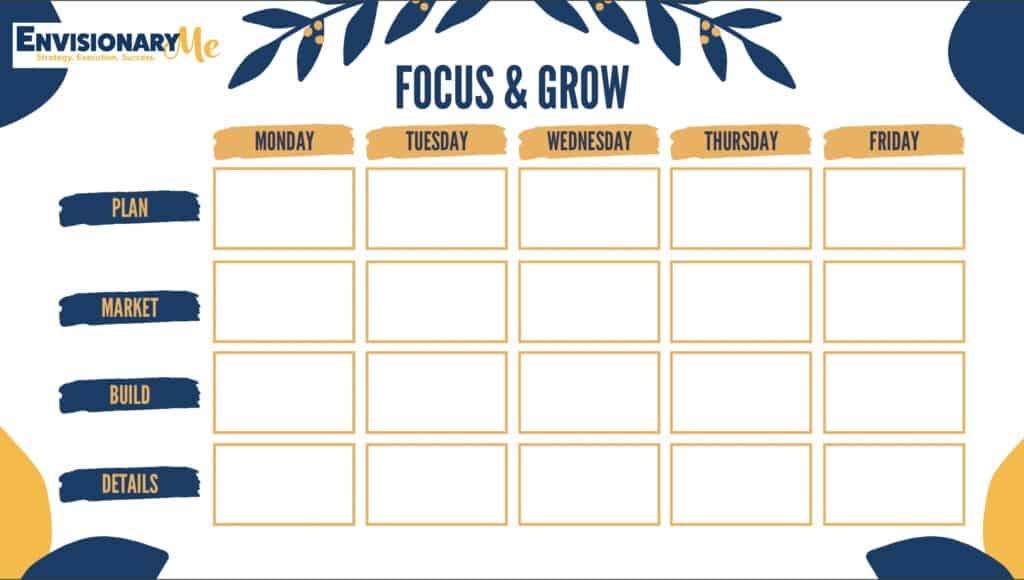Create balance while maximizing your productivity throughout your 40-hour workweek. Here’s how to plan and work a productive week using the three 8’s of work, recreation, and sleep. Plan, market, build, and handle the details, and still have time to rest and relax. A focused, productive 40 hours helps maximize your growth while promoting a balanced life.

The idea of working 40 hours a week helps you plan out your most productive week while maintaining balance in your life.
The purpose of this article is not to argue 40 vs. 32 or five 8-hour days vs. four 10-hour days. The purpose of this article is to help you increase productivity and balance. Having a flexible work schedule while being incredibly productive is the goal.
A strategically planned 40-hour workweek enables you to:
Ø Plan
Ø Market
Ø Build
Ø Handle the details
KEYS TO YOUR SUCCESS:
Productivity matters.
Your time has value.
Why use 40 hours as a benchmark?
It’s a traditionally accepted timeline, and it’s easy to understand. Taking it a step further and considering three 8-hour periods in a day (8 hours work, 8 hours recreation, 8 hours sleep) offers balance, allowing you to work more or less and build in time for another job and family needs.
The history of working 40 hours a week goes back nearly 100 years, but the strategy behind it isn’t outdated. Henry Ford created the schedule of working 40 hours per week years before the Fair Labor Standards Act was created. It wasn’t out of the kindness of his heart though, and it wasn’t about the type of work. He boosted productivity after finding his workers were more productive when they worked fewer hours and had two days off.
Whether you work for yourself or someone else, no successful business exists without productivity.
How many hours of work per day?
Consider an ideal work week and productivity.
Productivity is powerful. It allows you to maximize those other 16 hours of your day.
Having a plan for tomorrow allows you to sleep tonight.
The hours spent (and when) are less important than using the time productively and reaching your business goals.
Henry Ford may have popularized the 40-hour work week, and our decision to work overtime is based on eight hours a day, but as an entrepreneur, your needs will be unique. Focus on the strategy.
You’ll need to put in the hours, yes, but working long hours, total number of hours worked, daily hours, and all similar considerations come down to productive time – know your most productive hours vs. your least productive time and maximize it.

Be empowered. Have a strategy.
Do not let your week schedule you.
- Schedule your week top-down, utilizing your business plan.
- Rely on your successful habits.
- Actively use your business plan.
- Know what you must accomplish and what you would like to accomplish in 40 hours this week; then break it down across 8 hours a day, 5 days a week.
There are no rules and no magic solutions – but there are best practices.
It all starts with your business plan.
If you haven’t created your plan, do it now.
(seriously – like Now.)
Entrepreneurs are naturals in their home office environment. Like everyone else though, they need to manage the pros and cons of working their business from home.
As far as these suggestions are concerned – use them, tweak them, make your own. Your workday and hours per week are up to you. Work eight hours, work many hours, but have a strategy.
Just know…
When it comes to running your own business successfully, there’s no dipping your toe in the water. You are all in.

Design your week. Plan for success, and incorporate your key performance indicators.
Your KPI’s (key performance indicators) matter just as they do for anyone else’s business. Take yourself and your business seriously.
It doesn’t mean using planning time as a crutch and timewaster. Assess your business, then take what you know – and execute.
Example: Consider these buckets of time and how you might break down your day.

View our full Weekly Planning Guide.
Consider what works for you.
- What is your preferred start time, end time, what to do and when?
- What works best for you and your business needs?
You must be willing to put in the time. You may not get to sleep until the afternoon, but you don’t have to get up at 5 a.m.
Don’t forget – You also have 2 completely free days not included in this 40-hour thinking.
As an entrepreneur, you need to figure out where the time comes from and how to spend it.
What if you focus 40 hours per week on your business but still need another job to keep money coming in?
You can easily add in another part-time or full-time job. There ARE enough hours in the week.
The endgame is to ditch the other job, but you have to pay the bills. Maybe you choose a job that is fun or involves exercise, or teaches you a skill you need for your own business. Our schedules and needs are all different, but it can absolutely be done.
It simply can’t be done by sleeping 12am til 1 pm, then gaming for 5 hours, then scrolling and binge-watching for another 6.
Again – no magic – but also no wasted time.

How to plan this out?
Base how your hours are spent upon your own needs, but here’s an example:
Focus areas should/can include using your business plan, marketing yourself and your business, building upon the previous week and/or toward your goals, and knowing your details.
- Plan
- Market
- Build
- Details


There is no specific or necessary order to what needs to take place.
On Monday, perhaps you pull results first, while other activities you consider details fill in throughout your day.
If you prefer to start your week on a different day or plan at the end of the week for the following week, do it. If you are a very early riser or night owl, plan accordingly.
“All I’ve ever wanted was an honest week’s pay for an honest day’s work.”
Steve Martin
Funny? Of course! Untrue? Maybe not at all!
Maximize your time. Maximize your strategy. Maximize your return.
The strategy is not about debating an arrangement of a list. Just accomplish the list.
MONDAY
Monday: Consider results and strategize across 4 key focus areas:
1) Plan: Review your business plan, use it to create this week’s priorities: what you must, what you want to do.
- Executive Summary
- Opportunity
- Target Market
- Competition
- Sales & Marketing
- Operations
- Milestones
- Company
- Financial Plan
2) Market: Develop this week’s strategy and activities, such as creating your campaign and scheduling social media posts.
3) Build: Review last week’s growth and adjust your plan.
4) Details: Update business analytics and understand key learnings, adjust weekly objectives accordingly.
TUESDAY – FRIDAY
All include a little bit of planning, paired with a whole lot of execution!
Ø Plan: Confirm and/or set up meetings.
Ø Market: Follow through on designing your campaign and post timing
Ø Build: Follow through on your consumer outreach and networking plans, and advisor interactions
Ø Details: Set meeting objectives & agendas based upon your goals, time-bound objectives, and results of your analytics
Throughout your productive week, you accomplish so much!
- Time spent planning, on email, and on social media is used productively and not as a crutch.
- You prioritize your most important objectives.
- You are aware of your results and utilize that information to focus and tweak your strategy.
- You manage the details.
- Your ability to self-develop and embrace change is maximized.
- Your personal time is managed, and its value is maximized.
Your plan is active, with SMART goals reached through supportive activities, designed to yield positive results.
Thoughts that will run through your head!
- Is it actually a 40-hour week comprised of eight-hour days? People still do that?
- That’s what many employees work, but people who work that schedule seem unhappy.
- Does it matter if I’m my only employee?
- How do I decide to work more or less? Does it matter if I focus on each day vs. hours per week?
- How do I dedicate the right number of hours each day to grow my business and still work another job?
- What number of working hours can I actually work? How many days per week? If I work just one or work three, is it worth it?
- What does long hours actually mean to me? Will I be too stressed if I work more than 50 hours per week rather than 40?
- 25 hours, 44 hours per week, 50 hours a week?
- Is it actually possible to work more than 60 hours a week, 70 hours, 100 hours?
- How many hours are there in a day?? I need an extra day.
- Five days a week vs. a compressed work week with a 32-hour work schedule of just four days a week is how many hours per day? Can I actually work more hours?
- Will I be less productive because I take an hour to plan out each week?
- I should work at least an hour per day, right?
- Workers somewhere were more productive how? Many countries do what?
- Can I get eight hours of work into a 4 hour day?
- What will make me happier and more productive?
- Will I have better working conditions if I sit by a pool?
- How does remote work vs. going to a dedicated space outside your home affect work relationships?
- I’m not sure I like Henry Ford.
At the end of each day, whether you work one hour or five hours, work them strategically!
“The essence of strategy is choosing what not to do.” ~ Professor Michael Porter

And now – YOU – the ultimate maximizer – are off to the races!
Create your work model and honor your KPIs just like any other business.
Successful people are successful for a reason. Can you work less? Can you work more? Should you? Depends. You know if you are productive and building or doing a whole lot of nothing. As your business develops, you will do the work of several people until you can afford to pay them. Budget wisely – literally and figuratively. Be disciplined but cognizant of the three 8’s. You may work out of excitement. If it’s fun and motivational, great, but if or if not – do remember planning and balance make you more productive.
As the old saying in your very current, ever-changing world goes… Go get em, Champ! You got this!

0 Comments